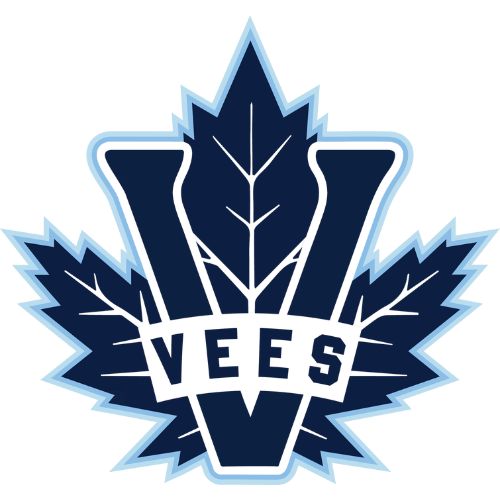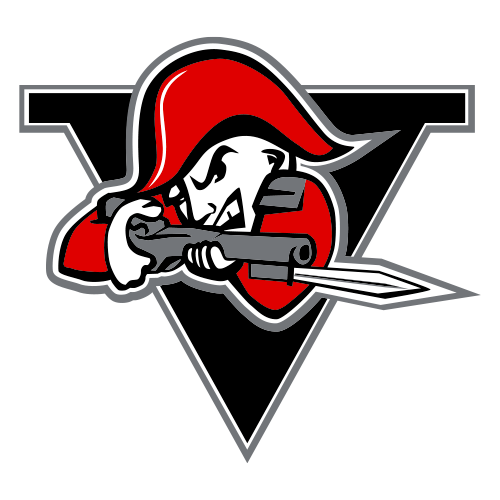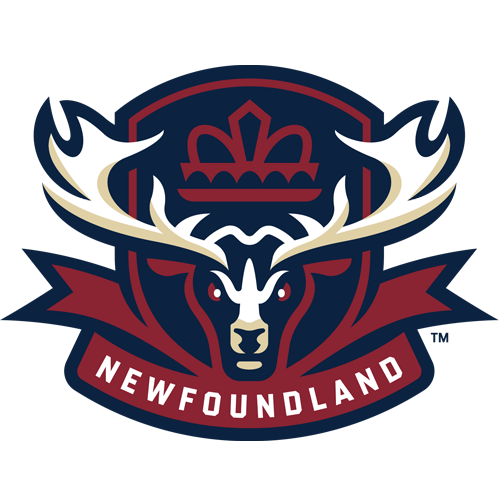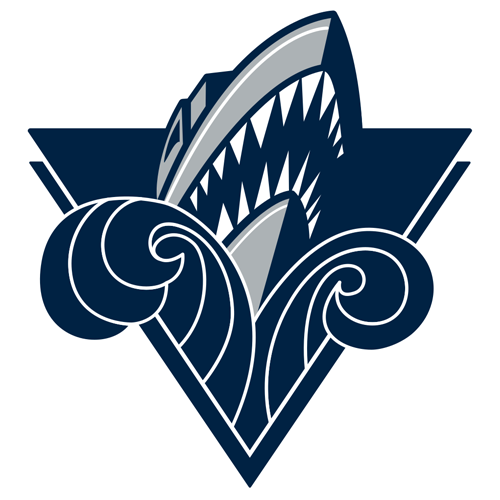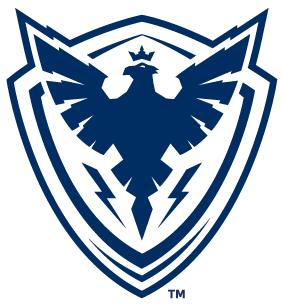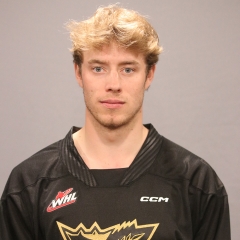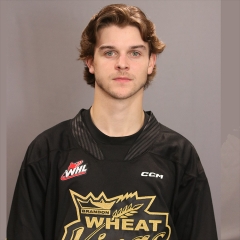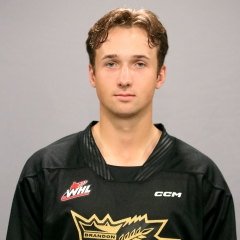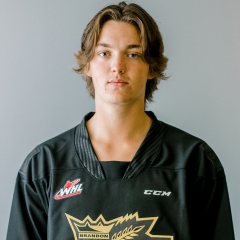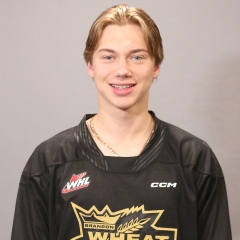COULSON TREASURES WHEAT KINGS EXPERIENCE
Courtesy of Perry Bergson, The Brandon Sun
Wes Coulson may have simultaneously had the world’s best and worst timing during and after the 1978-79 hockey season.
Now 61, the former Brandon Wheat Kings defenceman skated with the greatest team in the franchise’s Western Hockey League history and had an opportunity to play with many of the club’s icons.

But when it came to the National Hockey League draft that spring, he was eligible in a year when the number of eligible players doubled while the picks dropped dramatically.
Naturally, he chooses to focus on the former.
“I’m as proud as I could be to be part of that,” Coulson said. “To do it close to home where my friends could come and watch me play and my parents never missed a home game, it’s an honour and a privilege to be associated with that team … When they talk about that team and all those guys and it’s ‘Hey, you played on that team too.’ That to me is what it meant.”
Coulson was born and raised in Oak River, which is located 66 kilometres northwest of Brandon. His parents Ted and Audrey, who also had daughters Brenda and Leanne, farmed a mile and a half from town.
He began skating at age three.
“I always found a place to go and skate, on the farm as well,” Coulson said. “There was somewhere to skate. And maybe you didn’t have your skates on but made a makeshift net or used the side of the garage to shoot pucks.”
Coulson began playing organized hockey at age four because his dad was coaching the 10-and-under team, and he would come to the rink with him for games and practices. Eventually they threw him out on the ice too.
He was lucky enough to play his minor hockey in Oak River until he travelled to Minnedosa to join its midget and senior teams for the 1975-76 season.
“We were fortunate enough to have enough kids to make a team,” Coulson said of his minor hockey years. “We didn’t have a roster of 20 kids, that’s for sure. One year we had nine players, six forwards, two defencemen and a goaltender. I got to play the whole game.”
Since the team one age group above him was also short of players, he often played with them too.
He was almost always a defenceman — “I played goal once and it was a disaster. Never again. You have to be nuts to be in there.” — but occasionally played some forward with older age groups.
Junior teams took notice. At 14, Coulson was invited to camp with the WHL’s Flin Flon Bombers for the first of what proved to be two trips up north.

He thinks he was listed and either traded or dropped, because at 16 he was invited to Brandon’s camp.
That fall, he ended up at camp with the Saskatchewan Junior Hockey League’s Weyburn Red Wings and made the club but his parents insisted he come home.
“As life goes on, you realize that was the right decision for me,” Coulson said. “I didn’t like it at the time, but it was the right decision to come home and play my midget hockey at 16 and to get my Grade 11.”
He returned to Weyburn a year later and this time he stayed, contributing three goals, 33 assists and 64 penalty minutes in 60 games as a 17-year-old in the 1976-77 season. He also met his future Brandon teammates Brad Kempthorne and Don Gillen as the Red Wings went 46-14-0 to top the Southern Division and win the regular season league title.
They ultimately lost in the SJHL final to the powerhouse Prince Albert Raiders, who won the second of seven championships.
Coulson said longtime Weyburn coach Dwight McMillan was the first person to teach him hockey systems, but the lessons went well beyond that in preparing him for the next level.
“He taught what it was like to be a junior hockey player,” Coulson said. “That was a good stepping stone for me before I came back to Brandon.”
Coulson went to camp with the Wheat Kings to start the 1977-78 season, but failed to earn a spot. He was sent down to the Manitoba Junior Hockey League’s Brandon Travellers, who shared the Keystone Centre as their home.
After earning seven points in seven MJHL games, the Wheat Kings called him up.
He had arrived, but earning ice time was a different matter. Coulson said it took a while for veteran coach Dunc McCallum to trust him with ice time as part of his five-man defensive rotation.
“Dunc was a four-defencemen guy,” Coulson said. “There were a lot of nights I didn’t play very much. I played kind of sporadically. I might get two or three shifts a game.”
Sometimes Coulson knew ahead of time when he would be playing more.
His close friend and fellow defenceman Tim Lockridge would mention to him on the bench that an opponent was taking liberties with the team’s stars, so he was going to explain to the guy with his fists why that was a bad idea.
Coulson, who kept his mouth shut about ice time and always worked hard in practice, pounced on any opportunities he was presented.
He wasn’t a great skater or physically gifted but he was a good passer and was sound defensively.

“I wasn’t the biggest guy in the world,” Coulson said. “I was small, five-foot-nine and 175 pounds, and as a defenceman that was small in those days.”
He conclusively proved to McCallum that he belonged on Dec. 19, 1977. With top defenceman Brad McCrimmon playing with Wayne Gretzky on Team Canada at the world junior hockey championship, Coulson played a regular shift and exploded for two goals and four assists in a 10-5 drubbing of the visiting Bombers.
In his first 30 games before that night, he had nine assists.
“That was the turning point,” Coulson said. “It was totally different after Christmas. It was almost like I had paid my dues. I played a lot after that.”
His game grew exponentially that year, and it wasn’t Brandon’s opponents pushing him forward. Instead it was Wheat Kings practices as he faced top forwards such as Bill Derlago, Brian Propp, Ray Allison and Laurie Boschman.
“We practised against some of the best players in the league every day,” said Coulson, noting Derlago was incredible on one-on-one drills. “When you got to a game, there were players on the other team who weren’t their calibre … When you practise against the best, you’re going to get better.”
The improvement and the talented cast around him were reflected in Coulson’s numbers. He contributed nine goals, 30 assists and 86 penalty minutes in 69 games.
The crowds weren’t always huge, but Coulson called it an exciting environment where the fans were knowledgable and rewarded good plays.
People recognized the players around the city but Coulson said he and his teammates took it in stride.
“Nobody thought they were any better than anyone else,” Coulson said. “It was not a team of individuals, it was individuals that made a team, and that’s what I got from these guys … You didn’t think you were on top of the world. You were just a kid playing hockey in a town where people knew who you were.”
After winning their final 20 games and finishing first in the league with a 46-12-14 record, the 1977-78 season quickly came crashing down in the playoffs for the Wheat Kings.
In a post-season format that would absolutely puzzle newer fans — and likely some at the time — Brandon played a double home-and-home round-robin with Flin Flon and the Regina Pats. All four teams ended up with 4-4 records, but on a countback Brandon was ousted.
“It was disappointing,” Coulson said. “We had a great regular season, but regular seasons don’t equate to production in the playoffs if you’re not ready to play.”
Brandon graduated the high-scoring Derlago, but entered the 1978-79 season understanding it could be a special year.
“We all had the inkling we could be pretty good,” Coulson said.

A group of veterans met before camp, and it quickly became clear that they weren’t going to be satisfied with a good regular season or even a WHL title. They wanted to win a Memorial Cup.
They certainly started that way during a regular season in which they went 58-5-9, setting a league record of 125 points that still stands. They won their first 29 games, a winning streak that also remains a record.
“I don’t think we knew how good we were until about 15 or 20 games in,” Coulson said.
He remembers Brandon losing in an exhibition game against Team Russia, and then jumping on the bus for a game the next day in Edmonton. They didn’t play well, and the Oil Kings ended the winning streak.
“I remember Dunc was just furious that we lost,” Coulson said. “I remember thinking ‘Wow, that’s our first loss in 30 games and you’re really pissed off,’ but that’s the way it was. You won. That’s all you did. Losing wasn’t an option.”
It rubbed off on the fans as well. Coulson remembers the team’s supporters would attend games not wondering if they would win or lose, but rather questioning how much they would win by that night.
Coulson paired with rookie defender Don Dietrich of Deloraine, who was a quick learner and proved to be an excellent partner.
“Donny was good,” Coulson said. “He was just a young kid, 17 years old then, but you could tell he had talent. He was very offensive and he was always asking questions about this and that, which I really liked. He wasn’t a kid who came out and thought he knew everything.
“He was another small-town kid who was happy playing. He was a great defenceman to play with.”
McCrimmon, Lockridge and Mike Perovich were the other three defencemen to play big minutes. On March 11, 1979, however, Perovich suffered a compound fracture of his left arm in Regina, ending his season.
“I believe if we don’t lose Mike Perovich in that freak accident in Regina, I think we would have won the Memorial Cup,” Coulson said. “He would have been an extra 19-year-old defenceman. Maybe we wouldn’t have been as tired and beaten up by the time we got to Montreal.
“He was a great defenceman, great offensive skills, big guy, tough kid. When you lose a guy like that, it puts a little more pressure on Brad, Timmy Lockridge and even myself and Donny Dietrich. Now you’re playing a little more than you would regularly.”
Brandon’s playoff run began in style after their record-breaking regular season. The Wheat Kings went 7-1 in the division round-robin and then swept the Saskatoon Blades in the best-of-seven division final.
Coulson suffered a knee injury and a concussion in that series.
“I got banged up pretty good,” Coulson said.

The three division winners, Brandon, Portland and the Lethbridge Broncos, then met in a home-and-home round-robin that required the Wheat Kings and Winterhawks to fly back and forth for a single game. Lethbridge went 0-4 with the other two teams posting 3-1 records, so the Broncos were eliminated and the league final was set.
In six hard-fought games, the Wheat Kings prevailed over the Winterhawks but Coulson wasn’t on the ice to help them.
“I didn’t play the last three games in Portland because I had an AC sprain in my shoulder,” Coulson said. “The third game in Brandon, I got run pretty good into the end boards and basically sprained my shoulder. I travelled with the team out to Portland but didn’t play, which also put more pressure on (the other defencemen.)”
Coulson noted Brandonite Greg Mann was called up from the Travellers and played well.
He said it was a nice celebration in Portland but short because the team had to head home. The bigger event greeted them upon their return.
“There was a real good reception when we got back to Brandon,” Coulson said.
It wasn’t much of a break, however, as a day later they were on their way to Montreal for the Memorial Cup, which stretched from May 6 to 13.
“We were physically tired by the time we got done,” Coulson said of the WHL playoffs.
Coulson wasn’t going to miss the national tournament. Trainer Jack (Smoky) Stouffer taped him up so that he couldn’t lift his right arm above his shoulder, and Coulson played the five games essentially with one hand.
The Wheat Kings began the tournament poorly, falling 4-1 to the Trois-Rivières Draveurs and losing 7-6 in overtime to the Peterborough Petes.
“I remember Dunc saying ‘These kids have been through a lot, we’re fatigued,’” Coulson said. “Then we had a day off and it was almost like we got our second wind.”
Brandon beat Trois-Rivières 6-1 and then topped Peterborough 3-2. That set up the final with the Petes on May 13.
Peterborough’s Tim Trimper and Brandon’s Brian Propp both scored in the first period, the only goals in regulation. Unfortunately for the Wheat Kings, two minutes 38 seconds into overtime, Petes defenceman Larry Murphy sent a shot at Wheat Kings goalie Bart Hunter that bounced out front to Bob Attwell, and he made no mistake on the rebound.
Coulson was in front of the net when it happened, and still feels bad about the play.
“(The puck) went back to the point, the shot came through, Bart Hunter made the save and kicked it out and I want to say it went right by me, and I as I turned around, Bobby Attwell was right there and slapped it into the net,” Coulson said. “I was right there, It’s something that really bothers me. ‘Should I have been the guy who knocked him down or was I out of position?’

“I try to block it out because I was the guy who was in front of the net. That’s been a tough pill to swallow for a lot of years.”
Coulson said it was an emotional time, but after 99 games that season, almost a relief that it was over.
“It was a tough pill to swallow but life goes on,” Coulson said. “We came back to the dressing room, had a few beer, we got showered and went out for the night.”
They met early the next morning in the lobby of the hotel and flew back to Brandon.
“It was a long, long, long season but it was a good season,” Coulson said. “I enjoyed it. They are some of the best players I’ve ever played with. I played with some good guys in the minors but nothing like those guys.”
That’s when Coulson’s bad timing kicked in.
The NHL was holding its first draft after the merger with the World Hockey Association, and reduced the number of players who were set to be chosen from 234 in 1978 to just 126 in 1979. (It subsequently opened back up to 210 in 1980.)
The draft had always been reserved for 20-year-olds, but that year it was opened up to 19-year-olds as well. As a result, twice the players were available with half the picks.
The Wheat Kings enjoyed a historic draft, with 10 players chosen, Laurie Boschman (first round, ninth overall, Toronto), Brian Propp (first, 14th, Philadelphia), Brad McCrimmon (first, 15th, Boston), Ray Allison (first, 18th, Hartford), Mike Perovich (second, 23rd, Atlanta), Don Gillen (fourth, 77th, Philadelphia), Tim Lockridge (fourth, 80th, NY Islanders), Brad Kempthorne (fifth, 96th, Atlanta), Rick Knickle (sixth, 116th, Buffalo) and Dave McDonald (sixth, 123rd, Hartford).
But Coulson, who had 13 goals, 38 assists and 99 penalty minutes in 66 games, wasn’t taken.
“I didn’t expect to get drafted,” Coulson said. “Everyone wants to get drafted but when you look at it, they shortened it down to six rounds and took two years of guys. There were guys drafted in the third and fourth round who were hall of famers. It was a tough draft. I was quite disappointed.”
Dunc McCallum set Coulson up with agent Bill McFarlane, and he landed camp invitations for the defenceman from the Vancouver Canucks, Winnipeg Jets, Washington Capitals and Minnesota North Stars. They ultimately settled on Minnesota because they were setting up a new Eastern Hockey League squad, the Baltimore Clippers.
The organization also had the Oklahoma City Stars in the higher level Central Hockey League, and Coulson played with both clubs during the 1979-80 and 1980-81 seasons.
During his time with the North Stars, he got into one NHL exhibition game, which just happened to be in Winnipeg, close enough for his parents to attend.
“I remember Thomas Steen,” Coulson said of the game. “I thought ‘Holy frick, this guy is good!’ He was phenomenal. I think we tied the game and I played a regular shift. They kept throwing me out there and I don’t think I did poorly.”

Coulson said after his second minor pro season, his contract had ended. Minnesota GM Lou Nanne told him he had a good season and promised the team would call McFarlane, but it never happened.
Frustrated and embittered by what he considered a broken promise, he decided to pack it in and begin his life after hockey.
He said it wasn’t that hard to let go of the NHL dream.
“You eventually find out, the longer you go along, where you fit into that dream,” Coulson said. “You do eventually realize you just don’t have it, for whatever reason. Maybe you’re not big enough, maybe you’re not strong enough, maybe you don’t skate well enough, maybe you don’t think the game well enough.
“There comes a point in time where you realize you aren’t going to make it and I didn’t want to bounce around the minor leagues.”
Meanwhile, Coulson got married that summer to his wife Donna, who he met in Baltimore. They moved to Hamiota, a short drive from Oak River, and he helped on his parents’ farm and drove a transport truck in the winter.
He rented a half section in 1982, and still drove in the winter. In 1986, he bought three quarter sections and farmed full time.
He stayed on the land until 1999, then decided to do something different.
“I guess I just made too much money at it,” Coulson deadpanned, tongue firmly in cheek.
He worked for Elite Swine in Brandon for seven years, spending part of it as a territory manager, and then jumped into car sales in the city. But Donna was advancing in her career in medical lab work, and after time in Neepawa, they moved to Canmore, Alta., when she landed a job there in 2014.
“For all the times she followed me around and did all the stuff for me, I just couldn’t say ‘No, I don’t want to do this,’” Coulson said. “It was her time.”
He now drives a truck for a local construction company.
The couple have a pair of daughters, Erin and Lisa, and two grandchildren, Cole and Austin.
He certainly never gave up sports after retiring from pro hockey.
In the summers, he was a fixture in the Manitoba Senior Baseball League as a hard-hitting first baseman with the Hamiota Red Sox. The 1986-90 teams that he played on were inducted into the Manitoba Baseball Hall of Fame in 2012.
“I was really honoured to play with those guys and be part of that team,” Coulson said, adding Al Robertson invited him to join the club when he was 17.
He played senior hockey in the winter, coached the Yellowhead Chiefs for five years and also served as an assistant to Barry Butler with the Manitoba Junior Hockey League’s Waywayseecappo Wolverines for nine seasons from 2004 to 2013.
He had lessons from his career that he was eager to share with players.
“If you want something bad enough, with hard work and perseverance you can achieve it,” Coulson said. “That’s basically from me striving to get to the highest level. The other thing I tried to install in coaching is that nobody is bigger than the game. You have to be humble.
“And the other thing is that you have to play as a team. Life is a team sport. There’s not a lot of things you do by yourself. You always have to work with somebody.”
He said it’s always important to be good to people, and give back when you can.
Coulson now volunteers with the Alberta Junior Hockey League’s Canmore Eagles as a goal judge.
“There were people who volunteered their time for me while I was growing up through the hockey and the baseball,” Coulson said. “You have to give back.”
That magic 1978-79 season has never stopped giving back to Coulson.
Even with the passage of 42 years and life taking the teammates in different directions, it’s all still there for Coulson when he thinks about it.
“That was a long time but some of that stuff you just don’t forget,” Coulson said. “The guys I played like Steve Patrick and Kempthorne and Gillen and (Brant) Kiessig, Dave McDonald. You don’t forget those guys. They will always be friends of yours.
“Maybe you don’t see them, like Mike Perovich I haven’t seen in 40-plus years but I still remember his name and remember what he was like.
“That just doesn’t go away. You won’t remember the small things but you remember the people.”









